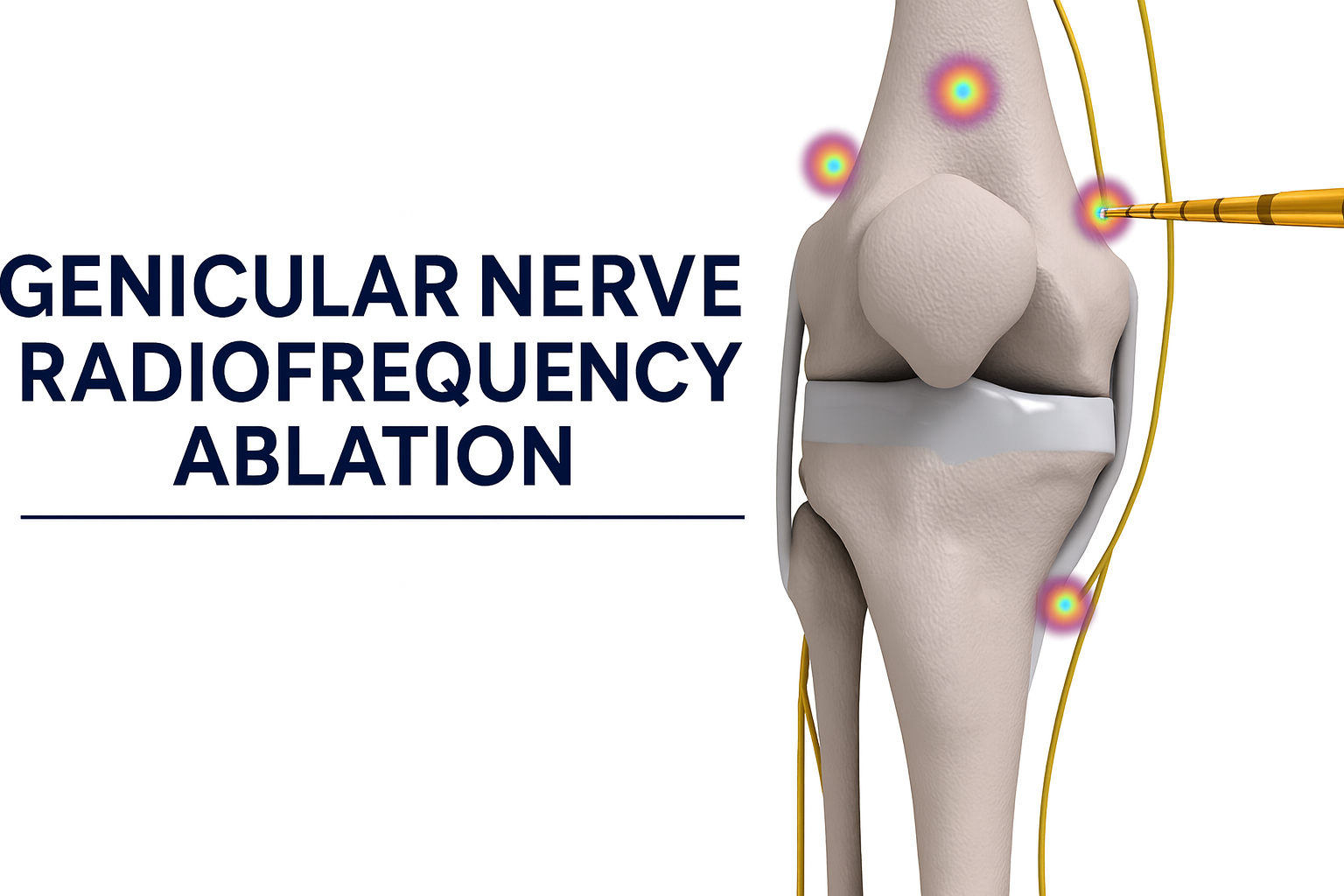Genicular Nerve Block and Radiofrequency Ablation (RFA)
(Minimally Invasive Treatment for Chronic Knee Pain)
Overview
Chronic knee pain from osteoarthritis or prior knee surgery can significantly affect your mobility and quality of life. When conservative treatments like physical therapy, medications, or injections are no longer effective—or surgery is not an option—genicular nerve blocks and radiofrequency ablation (RFA) may provide lasting relief.
This procedure targets small sensory nerves around the knee (the genicular nerves) responsible for transmitting pain. By blocking or ablating these nerves, we can reduce pain without affecting joint function.

Conditions Treated
- Knee osteoarthritis
- Chronic knee pain after total knee replacement
- Degenerative joint disease
- Knee pain not responsive to steroid or gel injections
What are the risks and side effects?
Risks and side effects are minimal, and serious complications are rare. We take every precaution to ensure your safety. Potential risks may include but are not limited to:
- Temporary increase in pain or soreness
- Bleeding, bruising, or infection (rare)
- Numbness or tingling near the knee
- Vasovagal response (lightheadedness or fainting)
- Allergic or unexpected reaction to medication
- Very rare chance of nerve injury
Ask your provider if you have any concerns. Your physician will review the risks in detail before the procedure to ensure you are fully informed.
Pre-Procedure Information
How Should I Prepare?
- Driver Required: We ask that you arrange for a driver to take you home after the procedure.
- Food: You may eat a light meal 1–2 hours prior to the procedure. If sedation is planned, please follow the specific sedation protocol provided by our team.
Medications:
- Continue routine medications unless directed otherwise.
-
Blood thinners, Aspirin, NSAIDs, and supplements:
- Inform us in advance if you take blood thinners (e.g., Plavix, Eliquis, Xarelto, Coumadin), NSAIDs (e.g., ibuprofen, naproxen), Aspirin, or supplements that increase bleeding risk.
- Certain medications may need to be stopped for a short period of time before the injection.
- Speak with your prescribing provider to ensure it’s safe to temporarily stop these medications.
- Our team will review your medication list and coordinate with your other providers if needed.
Notify us if:
- You have a fever, infection, or are feeling unwell.
- You have started antibiotics or had changes to your medications.
Sedation:
Most procedures can be performed comfortably without sedation. However, if you have anxiety or difficulty lying flat, mild sedation may be offered at the discretion of the physician. Please discuss this with your provider in advance.
Special Instructions for Diabetic Patients:
Steroid injections may raise blood sugar levels for several days.
- Please contact your primary care physician or endocrinologist prior to the procedure for management recommendations.
- Monitor your glucose closely after the injection.
- Report sustained elevations to your managing provider.
What if I am pregnant?
There are serious potential risks to an unborn fetus from imaging used during this procedure (e.g., X-ray/fluoroscopy). If there is any chance you may be pregnant, please notify our team immediately and postpone the injection until pregnancy is ruled out.
Procedure Information
The procedure is performed using sterile technique with image guidance.
Step-by-Step Treatment Process
Step 1 – Diagnostic Genicular Nerve Block
This initial test injection helps determine whether the genicular nerves are the source of your knee pain. Under fluoroscopic or ultrasound guidance, a small amount of local anesthetic is injected near the genicular nerves. If you experience significant temporary relief (usually for a few hours), you may be a candidate for the next step.
Step 2 – Genicular Nerve Radiofrequency Ablation (RFA)
If the test block is successful, RFA is performed. A special needle is guided to the genicular nerves and heated using radiofrequency energy. This deactivates the pain pathways and provides longer-lasting relief—often 6 to 12 months or more. This is a minimally invasive, outpatient procedure.
Post-Procedure Information
- Relief Timeline:: Soreness from the procedure is common. Lasting relief from RFA typically begins within 2–4 weeks.
- Activity: Rest for the remainder of the day. Resume light activities the following day and avoid heavy lifting or strenuous activity for 24–48 hours.
- Soreness:Temporary soreness at the injection site is common.
- Symptom Tracking: Keep a journal of your symptoms for follow-up.
If successful, additional injections may be spaced out over time—typically no more than 3–4 per year in the same region.
Additional Instructions:
- Contact the office for any signs of infection, fever, worsening pain or new weakness or sensory changes.
- Attend follow-up as scheduled.
Schedule a Consultation
If you're living with persistent knee pain and want to avoid or delay surgery, genicular nerve RFA may be an option. Contact Restore Spine and Pain to learn more and schedule a personalized evaluation.

